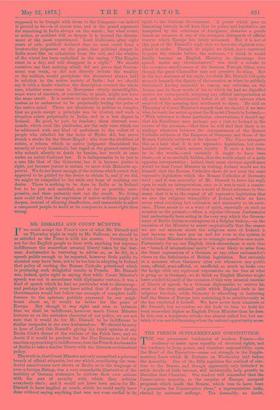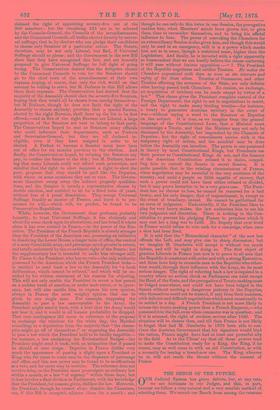THE FRENCH SUPPLEMENTARY CONSTITUTION.
two permanent tendencies of modern France---the tendency to insist upon equality of electoral rights, and the tendency to heap power, and therefore responsibility, upon the Head of the Executive—come out strongly in the Supple- mentary Laws which M. Dufaure on Wednesday laid before the Assembly. One of the Bills regulates the method of elec- tion to the Senate, and though apparently only intended to settle details of little interest, will incidentally help greatly to liberalise that Chamber. Our readers will remember that the Conservative majority, to the surprise of Europe, accepted proposals which made the Senate, which was to have been " a guarantee for Conservative ideas," a representative body, elected by universal suffrage. The Assembly, no doubt, claimed the right of appointing seventy-five out of the 300 members ; but the remaining 225 are to be selected by the Councils-General, the Councils of the arrondissements, and the Communal Councils, all bodies elected directly by univer- sal suffrage, that is, by electors who can pledge their candidates to choose only Senators of a particular colour. The Senate, therefore, may be not only Liberal, but Red, if Universal Suffrage should so please ; and the Government in the new Bill show that they have recognised this fact, and are honestly prepared to give Universal Suffrage its frill right of going wrong. The Conservatives desired that the delegates chosen by the Communal Councils to vote for the Senators should go to the chief town of the arrondissement at their own expense, hoping, of course, that only the rich would on that account be willing to serve, but M. Dufaure in this Bill allows them their expenses. The Conservatives had desired that the majority of the Assembly should elect the seventy-five Senators, hoping that they would all be chosen from among themselves ; but M. Dufaure, though he does not limit the right of the Assembly to choose anybody, provides that a special Bureau, elected by the eight Bureaus, shall draw up the list to be first offered,—and as five of the eight Bureaus are Liberal, a large proportion of the Senators are sure to belong to that party. The Conservatives hoped to seat as Senators many officials who could influence their departments, such as Prefects and Secretaries-General, but they are all declared in- eligible, even if they have resigned in order to be - elected. A Prefect to become a Senator must have been out of office for six months previous to the election. And finally, the Conservatives hoped, by refusing the Senators any pay, to confine the Senate to the rich ; but M. Dufaure, know- ing that many Liberals could not afford such promotion, and mindful that the right to elect supposes a right to elect the poor, proposes that they should be paid like the Deputies, with whom on some occasions they are to vote. The Govern- ment therefore sweep away the indirect property qualifica- tions, and the Senator is merely a representative chosen by double election, and entitled to sit for a fixed term of years, without fear of a penal dissolution. They accept Universal Suffrage frankly as master of France, and leave it to pro- nounce its will,—which will, we predict, be found to be Conservative-Republican.
While, however, the Government thus professes, probably honestly, to trust Universal Suffrage, it has obviously cast about for some check upon its aberrations, and has found it where alone it has ever existed in France,—in the power of the Exe- cutive. The President of the French Republic is already stronger than the President of the American one, possessing an initiative in dissolving the Lower House, a longer term of office, the control of a more formidable army, and patronage much greater in extent, and totally unfettered by the co-ordinate right of the Senate; but the supplementary law is intended to make him stronger still. By Clause 6, the President, who has no veto—the only authority possessed by the American which the French President lacks— is entitled to send back a law to the Assembly for " a fresh deliberation, which cannot be refused," and which will be en- riched by his written statement of his reasons for objecting. This will not only enable the President to arrest a law passed on a sudden burst of emotion, or under mob-terror, or in ignor- ance, but will also enable him to express his own opinion, always in France the most weighty opinion that can be given by any single man. For example, supposing the Assembly to pass a law unacceptable to the Army, the President might send it back, with a hint that the Army would not bear it, and it would in all human probability be dropped. That very contingency did occur in reference to the proposal to exchange the tricolour for the white flag, the Marshal remarking to a deputation from the majority that " the chasse- pots might go off of themselves ;" or supposing the Assembly to pass a law which the President held to be fatally impolitic— for instance, a law abolishing the Ecclesiastical Budget—the President might send it back, with an intimation that if passed he should at once resign. Deputies in France dislike very much the appearance of passing a slight upon a President or King, who for years to come may be the dispenser of patronage and office, and this new power may be found to be as efficacious as a veto, and far more easy to exercise. The reference does not involve delay, as the President must promulgate an ordinary law within a month, or a law " of urgency " within three days ; but it does involve a final division in Parliament, with the knowledge that the President, for reasons given, dislikes the law. Moreover, the President, though he cannot alone dissolve the Chambers, can, if this Bill is accepted, adjourn them for a month ; and
though he can only do this twice in one Session, the prerogative enables him, when Members' minds have grown hot, to give them time to reconsider themselves, and to bring his official influence to bear. The power of convoking the Chambers for an extraordinary Session is also given him, and though this would only be used in an emergency, still it is a power which marks him out as in some, though a restricted sense, higher than the Legislature. And finally, he is invested with a right apparently so transcendent that we can hardly believe the clause conferring it will pass without furious opposition :—" 7. The President of the Republic negotiates and ratifies Treaties. He makes the Chambers acquainted with them as soon as the interests and safety of the State allow. Treaties of Commerce, and other Treaties affecting the revenues of the State, are only definite after having passed both Chambers. No cession, no exchange, no acquisition of territory can be made except by virtue of a law." This clause gives the President complete control of the Foreign Department, the right to act in negotiations in secret, and the right to make many binding treaties—for instance, a treaty to guarantee Austrian territory in the event of war—without saying a word to the Senators or Deputies on the subject. It is true, as we imagine from the general language of the Constitutional Laws, that a Minister must countersign a Treaty, and that the iinister may not only be dismissed by the Assembly, but impeached by the Chamber of Deputies ; but the right of concealment carries with it the temporary right of action, and the mischief may be done before the Assembly can interfere. The power is one possessed in theory by most Constitutional Kings, but Presidents use their powers as Constitutional Kings do not, and the framers of the American Constitution refused it to theirs, compel- ling him to consult the Senate in secret Session. It is quite possible that in the existing circumstances of France, when negotiation may be essential to the very existence of the country, and amid a people so little capable of secrecy, that such a power could not have been either refused or divided, but it may prove hereafter to be a very grave one. The Presi- dent has no throne to lose, he cannot be removed for a bad treaty, and his only danger, that of impeachment, is, except in the event of treachery, unreal. He cannot be guillotined for an error of judgment. Undoubtedly, if the President likes to play for very heavy stakes, the law authorises him to use his own judgment and discretion. There is nothing in the Con- stitution to prevent his pledging France to promises which it may cost her a long war to fulfil. No Deputy that ever lived in France would refuse to vote cash for a campaign, when once a shot had been fired.
It is said that the " Monarchical character " of the new law offends the Left, and may give rise to sharp discussion; but we imagine M. Gambetta will accept it without too much debate, and will be right in doing so. The first object of genuine Liberals in France just now is to prove to all men that the Republic is consistent with order and with a strong Executive, and these laws help to reconcile men to the Republic who other- wise would, through their influence with the Army, be its most serious danger. The right of referring back a law is required in a country where no serious check on Parliament can exist except the Head of the State, and the prerogative of Treaty-making must be lodged somewhere, and could not have been lodged in the Senate without exciting a dangerous jealousy in the Deputies, who themselves could not be trusted, if only from their numbers, with delicate and difficult negotiations which need occasionally to be settled in a day. A French President is not more likely to misuse the treaty-making power than a French Emperor,—who possessed it to the full, even when commerce was in question ; and if it is misused, the right of revision revives after 1880. The situation will be clearer then, and till then France is not likely to forget that had M. Gambetta in 1870 been able to con- vince the Austrian Government that his signature would bind the nation, France might have had at least one powerful ally in the field. As to the Ultras' cry that all these powers tend to make the Constitution ready for a King, the King, if he comes, may as well come in with an old Constitution, as with a necessity for issuing a brand-new one. The King, whoever he is, will not reach the throne without the consent of France.



































 Previous page
Previous page